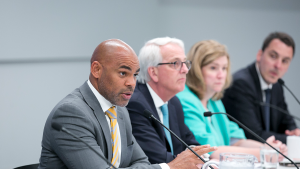Impossible Chicken, Fish Out of Water, and Political Earthquakes
Check out our roundup of the week's top news and research in food, agriculture, and global development.

Top Story
Shrinking Global Potable Water Supplies
Agriculture uses 70 percent of all water globally, placing a heavy burden on shrinking potable water supplies. According to the new UN World Water Development Report released Tuesday, just before World Water Day and the UN 2023 Water Conference, 26 percent of the world’s population does not have access to safe drinking water. With water demand only increasing, the report emphasizes the need to prevent the global water crisis from spiraling out of control, and points towards reclaimed water in agriculture as an increasingly viable option.
Council Insights
Beating the Odds
“They beat the odds, mainly due to the heroic efforts of their mothers, who had embraced the importance of good nutrition in giving their children the best possible start to life. Immune systems were strengthened, bodies had a solid foundation for growth, brains developed the paths to learning – all of which helped carry the children through the pandemic,” writes Senior Fellow Roger Thurow in a new epilogue on his book The First 1000 Days. Read the epilogue and watch the accompanying videos to learn more about the mothers and children, and where they are today.
 Food and Agriculture
Food and Agriculture
Food & Agriculture
Grain Standoff
The Black Sea Grain Initiative, which allows for the safe export of grain from Ukrainian and Russian ports, was renewed on March 18 for 60 days, only half of the intended period. Russia announced that any further extension of the agreement would hinge on removing some Western sanctions. Russian President Vladimir Putin said that Moscow could send free grain to African countries if those conditions went unmet, which would hurt European markets.
Fish Out of Water
Officials in the Catalonia region of Spain introduced new water-use restrictions due to the critically low average of the Sau reservoir’s water levels, which now stands at only nine percent of its total capacity. Farms must cut consumption by 40 percent and industry by 15 percent. Officials even made the decision to remove all fish from the reservoir to prevent them from asphyxiating.
Political Earthquakes
The Farmer-Citizen Movement, a new political party in the Netherlands, is projected to win 15 seats in the Dutch upper house, making it the largest party and delivering a blow to Prime Minister Mark Rutte and his coalition's environmental policies. The Prime Minister aims to reduce nitrogen emissions 50 percent by 2030 due to the detrimental effects of intensive farming practices, sparking stiff opposition from the agricultural industry. Farmers have been at the center of the new policies, with thousands taking part in months-long protests against the measures, which could put some of them out of business.
Deeper Dive
Why Are Water Levels at Critical Lows?
New water-use restrictions in Catalonia are not unique; regions around the world are grappling with shrinking water supplies. Europe, in particular, is in the midst of a drought which began last summer with hot weather and long dry spells, pushing down yields of maize, sunflowers, and other crops. As climate change accelerates, water levels are expected to continue falling, which is potentially calamitous for the agriculture industry.
Resilience
Climate Funding
Sweden is providing $19 million in funding to support climate finance in Mozambique, one of the most climate-vulnerable nations in the world. The grant, released over five years, will support the Local Climate Adaptive Living Facility project implemented with technical support from the UN Capital Development Fund. The project will address the vulnerability of the coastal region of Mozambique to tropical cyclones and droughts, while building infrastructure for drinking water and agricultural land.
DC Report
School Lunch Expansion
The USDA proposed allowing more schools in low-income communities to offer free breakfast and lunch to students without requiring their parents to apply for the benefits. The current eligibility threshold for the program requires that 40 percent of students at a school be on food stamps or participating in another safety-net program tied to household income. The agency wants to lower it to 25 percent to allow more schools to participate and to provide a higher reimbursement rate for free and reduced-price meals.
Big Actors
Walmart Win
The Walmart Foundation has announced a five-year plan to support one million smallholder farmers in India to improve livelihoods and boost farm incomes. Grants totaling over $4 million will be extended to non-profit organizations working on expanding access to market linkages, training farmers on sustainable farming methods and technology, and focusing on empowering women farmers. Walmart hopes to build on previous work with women farmers that supported higher cropping intensity and the cultivation of more high-value crops.
Big Ideas
Impossible Chicken
The USDA approved cultivated chicken made by Good Meat Inc. as safe to eat, making it the second company in the growing industry to have cleared a key regulatory hurdle. Cultivated meat is grown from animal cells in a nutrient-rich environment and then harvested, often combined with other ingredients to form different products. Good Meat Inc. must still obtain clearance from the USDA before selling its cultivated meat to American consumers.
Ask an Expert
Cindy McCain was officially appointed the next Executive Director of the World Food Programme (WFP). As a previous executive director of the WFP yourself, what do you think the transition will look like for McCain?
“It's exciting WFP will have such a wise and dedicated humanitarian as its new leader. Ms. McCain will have multiple challenges — and all the support she needs — to set the direction to raise funds and manage the large organization. She is succeeding [David Beasley], the most prolific fundraiser the organization has ever had, so she can build on that success. In addition, she has to give primary priority to leading and managing the large, far-flung organization. WFP staff are creative and dedicated; I am sure that they will look forward to a strong new leader.”
— Distinguished Fellow Catherine Bertini


Have a question about food and agriculture? Ask one of our experts at the Center on Global Food and Agriculture to get an answer in next week's Global Food for Thought!
Council Events
Did you miss one of our previous livestreams? Don't worry! They are all available on our website to watch at any time.
Other Upcoming Events
Student Climate Conference
Date: March 23 - 25
Investing in Youth for a Sustainable Future in Agriculture and Food Systems: A Dialogue on the Way Forward
Date: March 28
Time: 10:00 – 11:30 a.m. CEST
Every Bite Counts: End Factory Farming
Date: March 29
Time: 6:30 – 9:00 p.m. CT
Science and Innovation for Food Systems Transformation – Follow Up to the 2021 UN Food Systems Summit
Date: April 11
Time: 9:30 – 11:00 a.m. ET
2023 Hunger and Health Illinois Conference – Chicago
Date: May 1
Time: 10:00 a.m. – 3:30 p.m. CT
Land Acknowledgement Statement
The Center on Global Food and Agriculture recognizes it occupies the ancestral land of the Kiikaapoi, Peoria, Kaskaskia, Bodwéwadmi, and Myaamia people. Indigenous communities around the world disproportionately experience the pressures of climate change, global conflicts, and the COVID-19 pandemic, while simultaneously stewarding 80 percent of the world’s biodiversity. These Indigenous tribes and nations are the original owners of this land and continue to be systemically erased by policies and practices that ignore their histories. To learn more about Indigenous foodways and practices, check out our 2022 blog series "Stewardship, Sovereignty, and Solutions."
Related Content
- Embracing Dandelions as Food and Medicine
- Going Beyond Regenerative Agriculture on Tribal Lands
- Expanding "638" to Enhance Native American Food Sovereignty
- Flavors and Culture: Food Systems Through Indigenous Women's Eyes
- A Thanksgiving Legacy: Fighting for Indigenous Food Sovereignty
- Native Food Sovereignty: Strengthening Connection to Culture
- Reconnecting to Indigenous Food Sovereignty Values and Practices
- Embracing Interconnectedness: How Indigenous Foodways Can Save Us





